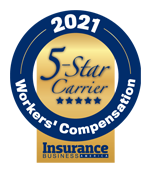
Best Excess Workers Compensation Coverage
Five-Star Excellence Awards in Worker’s Compensation
If employers are self-insured, an excess worker’s compensation policy is designed to help minimize the employer’s risk in the event of a claim. There are generally two categories of cover available – aggregate which will provide coverage once a cumulative figure from losses is reached, or specific which will provide a cap on any single claim. While this type of cover is very specialized, our 5-Star winners have shown they really are able to go above and beyond both with product and service in this specialized field.
5-Star Excellence Awards
- AIG
- Chubb
- Liberty Mutual Insurance
- Safety National
What is excess and surplus insurance?
Excess and surplus lines insurance gives buyers the opportunity to purchase, in the non-admitted market, casualty and property insurance. Companies could potentially find coverage in this portion of the industry when a standard carrier decides not to write a policy. Excess and surplus coverage, or E&S, is also known as hard-to-place business, specialty lines, and surplus insurance.
Writing what is referred to as ‘main street’ business, the E&S industry is typically made up of mid- to small-sized companies. A stable in the business is a small contractor or the owner of a building in a less attractive neighbourhood, for example. Some larger companies will write business – for example, oil refineries and aircraft liability – but, for the most part, small companies dominate this industry.
What is excess workers’ compensation insurance?
Excess workers’ compensation protects the self-insured employer financially for workers’ comp claims that exceed the specified dollar limit. Essentially, excess workers’ comp covers all losses up to a specific amount or an unlimited amount, depending on the employer’s choice.
Beyond the benefit of reimbursement for workers’ compensation claims that are higher than the self-insured amount, excess workers’ compensation does have other benefits, such as addition services like: emergency planning and preparation; guidance in meeting the required regulations; onsite safety checks and reviews; best practices for managing workers’ comp claims; underwriting guidance; assistance in managing and controlling workplace hazards; and catastrophic claim management.
A lot of self-insurers are unable to self-insure without an excess workers’ comp policy, because self-insurance provides the risk manager control over the price of the company insurance program, which then provides them greater control of the claims and improves the cashflow by lowering the cost of the insurance.
What does surplus lines mean in insurance?
For a risk that is too expensive for a standard insurer to undertake, surplus lines insurance offers protection. Surplus lines can be used by individuals and businesses alike. This insurance – unlike standard insurance – can be purchased from an insurer that does not have a license in the insured’s state, but the surplus lines insurer does require a license in the state that it’s based in.
To understand surplus lines insurance, it is important to note that it carries additional risk for the policyholder, since there is no guaranty fund to obtain a claim payment from if the surplus line insurer goes bankrupt (which is the case with standard insurance policies).
Is surplus lines insurance safe?
Surplus lines coverage is generally the same to that used by admitted companies and are subject to the same laws protecting consumers by ensuring good-faith claims handling. Surplus lines companies do, in fact, have the freedom to set rates without the approval of the state – which results in fair, rather than excessive, rates. Surplus lines insurance companies are also fully regulated in the state they reside in. In Florida, for example, they are monitored by the Office of Insurance Regulation and are required to provide extensive financial documentation to be placed on that state’s list of eligible surplus lines carriers.
What do surplus lines brokers do?
A surplus lines broker is authorized to place insurance with non-admitted insurers that are not licensed in the state where the insured does business, and who secures coverage from an E&S lines insurer. Occasionally, businesses have poor loss history, for instance, or risky operations, making them
unattractive to standard insurers. These businesses may require a surplus line broker’s services to obtain the coverage needed.
Surplus lines brokers serve as intermediaries between brokers and insurance agents and E&S insurance companies – and do not deal with buyers directly. If an agent is unsuccessful in securing insurance for a business from a standard insurer, for instance, they will enlist a standard line broker to secure coverage in the E&S marketplace.
Keep up with the latest news and events
Join our mailing list, it’s free!
